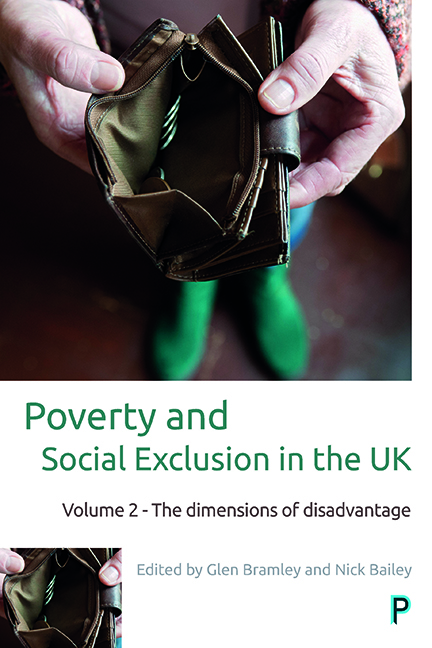three - Severe poverty and destitution
Published online by Cambridge University Press: 12 April 2022
Summary
Introduction
While most of this book is concerned with relative poverty and social disadvantage in the context of a mature post-industrial welfare state, this chapter focuses on the more extreme end of conventional poverty measures, ‘severe poverty’, and then steps beyond that to examine literal ‘destitution’. There has been growing concern that such extreme manifestations have become more apparent in the UK since the late 2000s, for example with the rapid growth of food banks, with heightened awareness of the plight of some migrant groups, and with changes in the benefit system hard on the heels of a major recession. While traditionally such problems have been seen as associated with particular groups, such as single homeless people with complex needs or vulnerable migrant groups, there is a sense that they are spreading out to affect a wider spectrum of the UK population.
This chapter will combine evidence from the PSE-UK survey and other national surveys with evidence from a new study specially commissioned to investigate destitution in the UK. From the former, it will examine the picture on severe poverty, including trends over time and the demographic profile of who is affected. It will then put forward a robust definition of destitution which, like PSE-UK's definition of poverty, reflects public consensus views. It will report on an agency-based ‘census’ carried out in 10 local authority areas across the UK in 2015, and from this make national estimates of the scale of destitution nationwide. It will also present evidence on the socio-demographic profile of the destitute alongside the severely poor, on the background circumstances that underlie their plight, and on what sources of financial and in-kind support they rely upon. From all of this evidence, the authors argue that severe poverty has increased in the UK, and spread out from particular known vulnerable groups to a wider spectrum of UK households. The chapter discusses the proximate and underlying reasons for this spread, including a range of policy and administrative factors around the benefits and migration systems as well as underlying poverty (not least its geography) and the impacts of recession and austerity.
- Type
- Chapter
- Information
- Poverty and Social Exclusion in the UK Vol 2The dimensions of disadvantage, pp. 91 - 112Publisher: Bristol University PressPrint publication year: 2017

